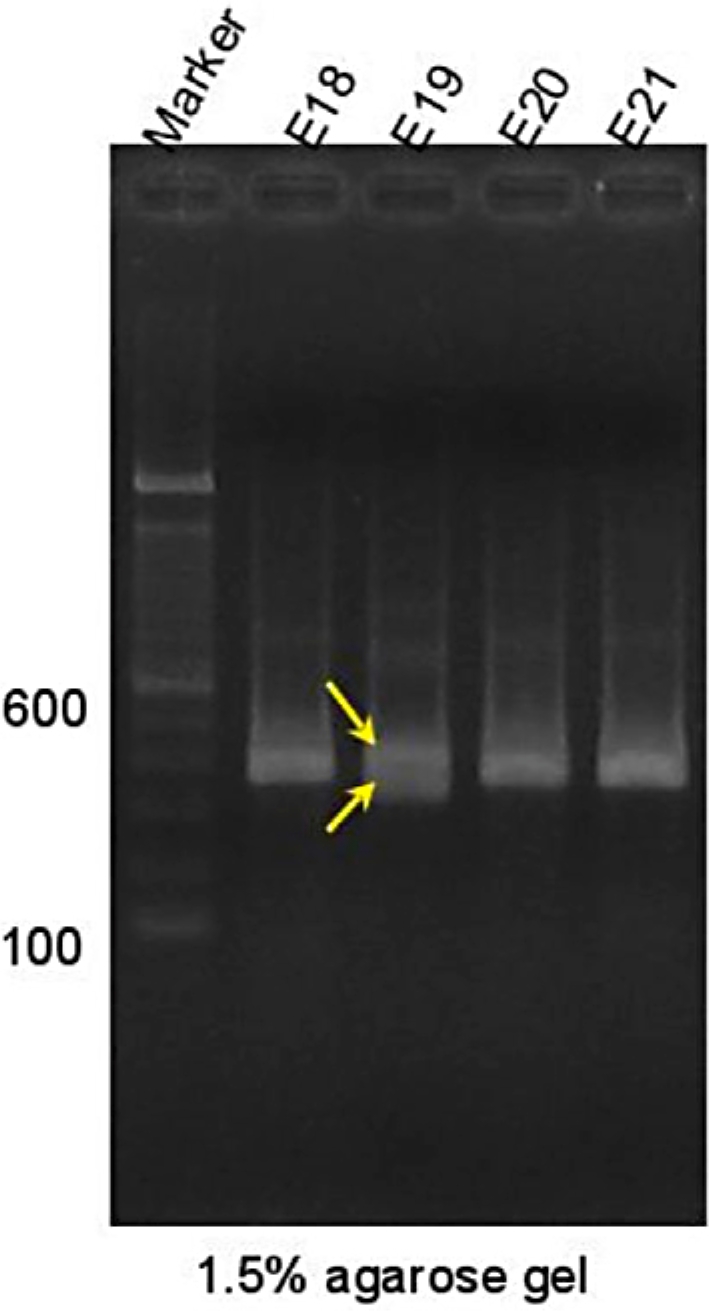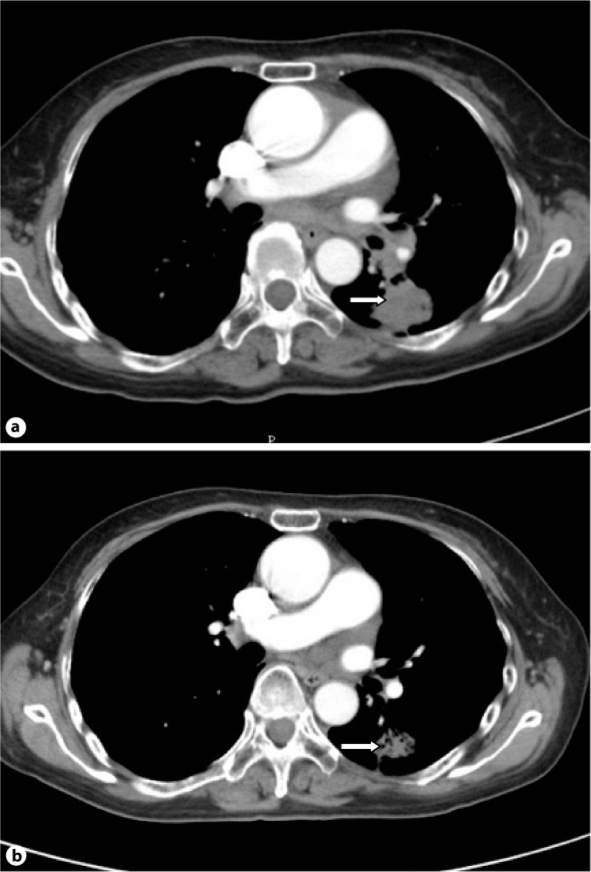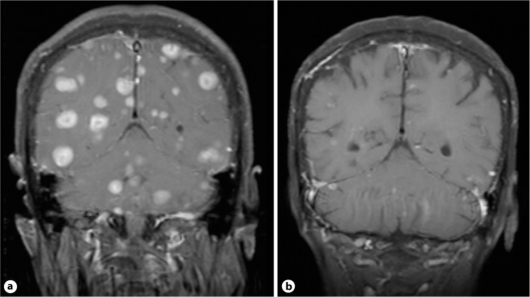Abstract
We report the case of a woman with diffuse brain metastases from lung cancer who experienced total regression of the metastases under gefitinib treatment. The 58-year-old woman was referred to our hospital with a complaint of severe headache. A brain MRI revealed diffuse metastatic lesions in the cerebra and cerebellum. Adenocarcinoma of the lung with multiple brain metastases was diagnosed. The tumor was positive for an epidermal growth factor receptor (EGFR) exon 19 deletion mutation. She was treated with gefitinib 250 mg per day. One year later, the diffuse brain metastases had totally resolved. EGFR-tyrosine kinase inhibitor therapy could be a first-line treatment for patients with advanced adenocarcinoma of the lung with EGFR mutation, especially in those with brain metastases.
Key words: Gefitinib, Lung cancer, Brain metastasis, EGFR mutation
Introduction
Brain metastases are the most common type of intracranial neoplasm, and lung cancer is the most frequent neoplasm of brain metastases. Non-small cell lung carcinoma (NSCLC) has a 20–40% chance of developing brain metastases in the disease course [1].
Whole-brain radiotherapy or platinum-based chemotherapy have been the standard therapy choices for patients with brain metastases, but the prognosis of patients with brain metastases is still disappointing. Penetration of chemotherapeutic drugs into the central nervous system (CNS) is limited primarily by the blood-brain barrier (BBB) [2].
Gefitinib is an oral agent and epidermal growth factor receptor (EGFR) tyrosine kinase inhibitor (TKI), which has been reported to be effective in the treatment of brain metastases from NSCLC by overcoming the BBB. An EGFR mutation is a predictive biomarker for a good response to EGFR-TKI, even in brain metastases [3].
Here, we report the case of a woman with diffuse brain metastases from lung cancer who experienced total regression of the metastases under gefitinib treatment.
Case Report
The patient, a 58-year-old married Taiwanese woman, was referred to our hospital with a complaint of severe headache and unsteady gait for 2 months.
The patient had had a 10-year history of hypertension and a 4-year history of hyperthyroidism with regular follow-up. She denied cigarette smoking and alcohol consumption. Physical examinations revealed tenderness over her posterior neck and drowsy consciousness, with a Glasgow Coma Scale score of E2, V4, M4, and an ECOG performance status of grade 4.
On admission, the patient underwent a brain MRI which revealed diffuse metastatic lesions of variable sizes in the cerebra and cerebellum (fig. 1a). A chest X-ray revealed a focal mass in the left infrahilar region, and a chest CT scan showed a lobulated mass, measuring 3.5 × 2.1 cm2, in the superior segment of the left lower lobe (LLL) of the lung with pleural effusion (fig. 2a). The pathology of a transthoracic lung biopsy revealed adenocarcinoma. The Tc99M whole-body bone scan revealed multiple bone metastases. Therefore, adenocarcinoma of the LLL portion of the lung, with brain and bone metastases, cT2N3M1, stage IV was diagnosed.
Fig. 1.
Chest response after 6 months of EGFR-TKI gefitinib therapy. CT scan showing a lobulated mass with pleural retraction in the superior segment of the LLL: before (a) and after (b) EGFR-TKI gefitinib therapy, with evident size reduction.
Fig. 2.
Brain response after 6 months of EGFR-TKI gefitinib therapy. MRI showing diffuse metastasis of brain lesions: before (a) and after (b) EGFR-TKI therapy gefitinib, with total regression.
An analysis of the EGFR mutation elucidated a Glu746_Ala750 deletion in exon 19 (fig. 3). The patient received EGFR-TKI therapy with gefitinib 250 mg per day. Her subjective symptoms improved gradually within 1 month of gefitinib therapy. After 6 months of treatment, a chest CT scan revealed partial remission of the primary pulmonary tumor, measuring 3.0 × 1.5 cm2 (fig. 2b). A brain MRI showed the dramatic total regression of the diffuse brain metastatic lesions (fig. 1b). Currently, the patient continues to receive EGFR-TKI therapy, and her survival time has exceeded 18 months since the initial diagnosis. So far, the patient has had a good ECOG performance status of grade 1 and no obvious recurrence elsewhere.
Fig. 3.

PCR showing two bands for exon 19, denoting a small deletion in that exon. The lower band is the deleted product and the higher band is a heteroduplex of wild and deleted fragments.
Discussion
NSCLC with brain metastases is usually associated with a poor outcome, and treatment is palliative in most cases. Multiple brain metastases are associated with an even worse prognosis, and median overall survival is only a few months. Standard treatment options include symptomatic therapy with whole-brain radiotherapy and corticosteroids, which lead to a median survival of 3–6 months [4].
The use of conventional chemotherapy for brain metastases has been limited because of a presumed lack of effectiveness due to poor penetration beyond the BBB. The BBB is a highly specialized structure of astrocytes, pericytes, and vascular endothelium that maintains CNS homeostasis. In a mouse model, the BBB has already been found to be permeable to brain metastases of tumors <0.25 mm in diameter. CT scans and MRI have detected edema, and contrast enhancement in brain metastases has confirmed the disruption of the BBB, which is no longer intact when brain metastases become clinically detectable. Further studies show that EGFR-TKI has a low molecular weight and could penetrate beyond the BBB. Therefore, it might be efficacious in the treatment of brain metastasis [5, 6].
Many studies have proposed several factors which could make it possible to predict the response to gefitinib in patients with advanced NSCLC, for example, Asian female, non-smoker, with adenocarcinoma, and the presence of an EGFR mutation. To our knowledge, the most common types of EGFR mutation are an exon 19 deletion and an exon 21 L858R mutation [7].
In our case, an Asian female had adenocarcinoma of the lung with diffuse brain metastases and was treated with gefitinib therapy because of an EGFR exon 19 deletion. After 6 months of follow-up, the dramatic response of total regression of the brain metastases was proved by brain MRI. As of now, our patient has survived more than 18 months since the initial diagnosis.
In conclusion, NSCLC patients with brain metastases usually have poor performance statuses. Chemotherapy has had limited effect in brain metastases. Therefore, due to its ability to reverse poor performance status and achieve the unbelievable response of total regression of brain metastases, EGFR-TKI therapy could be considered as a first-line treatment for advanced adenocarcinoma of the lung, positive for an EGFR mutation, with brain metastases.
References
- 1.Hashimoto N, Imaizumi K, Honda T, Kawabe T, Nagasaka T, Shimokata K, Hasegawa Y. Successful re-treatment with gefitinib for carcinomatous meningitis as disease recurrence of non-small-cell lung cancer. Lung Cancer. 2006;53:387–390. doi: 10.1016/j.lungcan.2006.05.016. [DOI] [PubMed] [Google Scholar]
- 2.Yokouchi H, Yamakazi K, Kinoshita I, Konishi J, Asahina H, Sukoh N, Harada M, Akie K, Ogura S, Ishida T, Munakata M, Dosaka-Akita H, Isobe H, Nishimura N. Clinical benefit of readministration of gefitinib for initial gefitinib-responders with non-small cell lung cancer. BMC Cancer. 2007;7:51. doi: 10.1186/1471-2407-7-51. [DOI] [PMC free article] [PubMed] [Google Scholar]
- 3.Shimato S, Mitsudomi T, Kosaka T, Yatabe Y, Wakabayashi T, Mizuno M, Nakahara N, Hatano H, Natsume A, Ishii D, Yoshida J. EGFR mutations in patients with brain metastases from lung cancer: association with the efficacy of gefitinib. Neuro Oncol. 2006;8:137–144. doi: 10.1215/15228517-2005-002. [DOI] [PMC free article] [PubMed] [Google Scholar]
- 4.Bearz A, Garassino I, Tiseo M, Caffo O, Soto-Parra H, Boccalon M, Talamini R, Santoro A, Bartolotti M, Murgia V, Berretta M, Tirelli U. Activity of Pemetrexed on brain metastases from non-small cell lung cancer. Lung Cancer. 2010;68:264–268. doi: 10.1016/j.lungcan.2009.06.018. [DOI] [PubMed] [Google Scholar]
- 5.Choong NW, Dietrich S, Seiwert TY, Tretiakova MS, Nallasura V, Davies GC, Lipkowitz S, Husain AN, Salgia R, Ma PC. Gefitinib response of erlotinib-refractory lung cancer involving meninges – role of EGFR mutation. Nature. 2006;3:50–57. doi: 10.1038/ncponc0400. [DOI] [PubMed] [Google Scholar]
- 6.Katayama T, Shimizu J, Suda K, Onozato R, Fukui T, Ito S, Hatooka S, Sueda T, Hida T, Yatabe Y, Mitsudomi T. Efficacy of erlotinib for brain and leptomeningeal metastases in patients with lung adenocarcinoma who showed initial good response to gefitinib. J Thorac Oncol. 2009;4:1415–1419. doi: 10.1097/JTO.0b013e3181b62572. [DOI] [PubMed] [Google Scholar]
- 7.Yi HG, Kim HJ, Kim YJ, Han SW, Oh DY, Lee SH, Kim DW, Im SA, Kim TY, Kim CS, Heo DS, Bang YJ. Epidermal growth factor receptor (EGFR) tyrosine kinase inhibitors (TKIs) are effective for leptomeningeal metastasis from non-small cell lung cancer patients with sensitive EGFR mutation or other predictive factors of good response for EGFR TKI. Lung Cancer. 2009;65:80–84. doi: 10.1016/j.lungcan.2008.10.016. [DOI] [PubMed] [Google Scholar]




